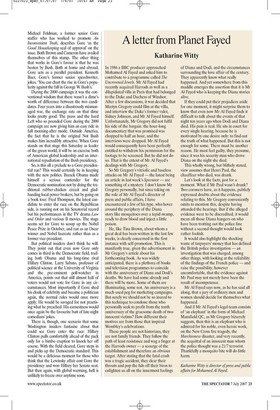A letter from Planet Fayed
Katharine Witty In 1986 a BBC producer approached Mohamed Al Fayed and asked him to contribute to a programme called The Uncrowned Jewels. Mr Al Fayed had recently acquired Harrods as well as a dilapidated villa in Paris that had belonged to the Duke and Duchess of Windsor. After a few discussions, it was decided that Martyn Gregory could film at the villa, and interview the Duke's former valet, Sidney Johnson, and Mr Al Fayed himself. Unfortunately, Mr Gregory did not fulfil his side of the bargain: the hour-long documentary that was promised was chopped to half an hour, and the interviews were dropped. Mr Al Fayed would consequently have been perfectly entitled to withdraw his permission for the footage to be screened. But he did not do so. That is the extent of Mr Al Fayed's dealings with Mr Gregory.
So Mr Gregory's vitriolic and baseless attacks on Mr Al Fayed — the latest being an article in last week's Spectator — are something of a mystery. I don't know Mr Gregory personally, but since taking on the role of Mr Al Fayed's director of press and public affairs, I have encountered a few of his type, who hover around the periphery of the Diana story like mosquitoes over a tepid swamp, ready to draw blood and inject a little poison.
He, like Tina Brown, about whom a great deal has been written in the last few weeks, is clearly concerned in the first instance with self-promotion. This is manifestly true, given the advertisement in Mr Gregory's article about his forthcoming book. As was widely anticipated, there is a plethora of books and television programmes to coincide with the anniversary of Diana and Dodi's deaths. We have had some already and there will be more. Some of them are illuminating, some not. An anniversary is a much-used peg for marketing campaigns. But surely we should not be so inured to this technique to condone those who personally seek to profit from the tenth anniversary of the gruesome death of two innocent victims? How different their motives are from those that inspired Wembley's celebrations.
These people are not historians, they are not family friends. They follow the path of least resistance and wag a finger at the Harrods owner — a scourge of the establishment and therefore an obvious target. After stating that the fatal crash was a tragic accident, they clear their throats and pop the lids off their biros to enlighten us all on the innermost feelings of Diana and Dodi, and the circumstances surrounding the love affair of the century. They apparently know what really happened. And yet somewhere from this muddle emerges the assertion that it is Mr Al Fayed who is keeping the Diana stories alive.
If they could put their prejudices aside for one moment, it might surprise them to know that even now Mr Al Fayed finds it difficult to talk about the events of that night ten years ago when Dodi and Diana died. His pain is real. He sits in court for every single hearing, because he is motivated by one desire only: to find out the truth of what happened. But this is not enough for some. There must be another reason. He must feel guilty, they presume, since it was his security man who drove Diana on the night she died.
This wholly wrong, but blithely stated, view assumes that Henri Paul, the chauffeur who died, was drunk.
Let's look at the facts, just for a moment. What if Mr Paul wasn't drunk? Two coroners have, as it happens, publicly expressed doubts about the evidence relating to this. Mr Gregory conveniently omits to mention this, despite having attended the hearings. But if the alleged evidence were to be discredited, it would mean all those Diana hangers-on who have been trotting out the police line without a second thought would look rather foolish.
It would also highlight the shocking waste of taxpayers' money that has defined the British police investigation — an investigation that was charged, among other things, with looking at the reliability of the findings of the French police — and raise the possibility, however uncomfortable, that the evidence against Mr Paul may not merely have been the result of incompetence.
Mr Al Fayed says now, as he has said all along, that a jury of ordinary men and women should decide for themselves what happened.
And if Mr Al Fayed's legal team consists of 'an elephant' in the form of Michael Mansfield QC, as Mr Gregory bizarrely suggests, then this is an elephant who is admired for his noble, even heroic work, on the New Cross fire tragedy, the Marchioness disaster, and very recently, the acquittal of an innocent man whom the police thought was a 21/7 terrorist. Thankfully a mosquito bite will do little harm.
Katharine Witty is director of press and public affairs for Mohamed Al Fayed.



















































 Previous page
Previous page